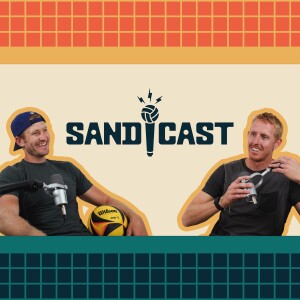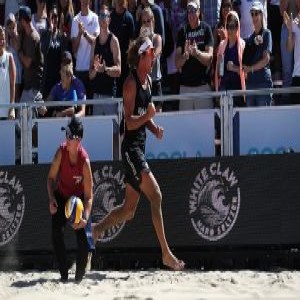
SANDCAST: Beach Volleyball with Tri Bourne and Travis Mewhirter
Sports:Volleyball

Martins Plavins requested the mic from Aleksandrs Samoilovs. Had to set some matters straight.
“I know,” Plavins said on Saturday night at p1440 San Jose, “that Edgars misses me.”
He was joking – maybe, possibly, perhaps – but Sunday’s result, when the Latvians upended the world’s best in Norway’s Christian Sorum and Anders Mol in the finals, proved that there’s likely a bit of truth to the notion that Edgars Tocs, Plavins’ typical partner, may have been missing his defender.
Plavins and Tocs, Latvia’s No. 2 team behind Samoilovs and the injured Janis Smedins, were one of the world’s most delightful surprises in the 2018 FIVB season. Entering the year, Tocs, a 29-year-old from Madona, had never eclipsed the five-figure threshold in prize money, with just three main draws to his name in all of 2017.
Yet there they were, on podium after podium to begin the year – gold at The Hague in January, silver in Kish Island a month later. By the end of the year they had played in 13 events, nearly as many main draws as Tocs had played in his entire career.
By season’s end, they were ranked fifth in the world, three spots behind Samoilovs and Smedins, and a country that is roughly the size of Nebraska in terms of population was suddenly home to two of the world’s beach volleyball powers.
Not that Latvia is an upstart. Not by any means. Ten years ago, Samoilovs and Plavins authored arguably the greatest upset in Olympic beach volleyball history when they stunned Phil Dalhausser and Todd Rogers in the first round of pool play. In 2012, Plavins did it again, this time with Smedins, upsetting Jake Gibb and Sean Rosenthal – then the No. 1 team in the world – in the quarterfinals of the 2012 Olympics in London.
“We used to play good together,” Samoilovs said. “[Martins] agreed to come to San Jose so I’m very happy he had a chance to join me.”
In two years, for the second time in three Olympics, they might very well join each other as teammates on separate teams. While Plavins was winning a bronze medal with Smedins in 2012, Samoilovs took a ninth with Ruslans Sorokins.
“Martins is one of the best defenders in the world,” Samoilovs said, which explained why, in San Jose, Samoilovs, typically a split-blocker, stayed at the net. “It doesn’t make sense to go block.”
Indeed it seemed they found the right defensive system, as they lost just one set the entire weekend in San Jose, to Austrian Olympian Alexander Huber and Leo Williams in the first round. After that, it was dominant win after dominant win, over Piotr Marciniak and Canadian Olympian Chaim Schalk, Spaniards Adrian Gavira and Pablo Herrera, Americans Miles Evans and Billy Kolinske and the world’s best in Noway’s Mol and Sorum.
More important for either than the winning, though, is the fact they have a chance to win anything at all. Samoilovs remembers what it was like post-2016, when the world tour had just eight events big enough for the best to play, when beach volleyball was somewhat of a wasteland.
With the advent of the King of the Court series and p1440, as well as the extension of the FIVB season, the sport has become nearly year-round.
“This is really great,” Samoilovs said. “I remember after the Rio Olympics, in 2017, it was a disaster. It was only eight World Tour events, so you spend three months preparation just to play eight weeks, two months, so for us players we’re relieved because of these tournaments. Our families live because of these tournaments. It’s important to have more opportunities and more tournaments to earn money and to have a better life.”
More Episodes
 2024-10-23
2024-10-23
 1.3k
1.3k
 2024-10-09
2024-10-09
 1.8k
1.8k
 2024-10-02
2024-10-02
 1.6k
1.6k
 2024-09-23
2024-09-23
 1.2k
1.2k
 2024-09-19
2024-09-19
 1.5k
1.5k
 2024-09-02
2024-09-02
 1.6k
1.6k
 2024-08-29
2024-08-29
 1.5k
1.5k
 2024-08-28
2024-08-28
 1.5k
1.5k
 2024-08-19
2024-08-19
 1.6k
1.6k
Create your
podcast in
minutes
- Full-featured podcast site
- Unlimited storage and bandwidth
- Comprehensive podcast stats
- Distribute to Apple Podcasts, Spotify, and more
- Make money with your podcast
It is Free
- Privacy Policy
- Cookie Policy
- Terms of Use
- Consent Preferences
- Copyright © 2015-2024 Podbean.com



